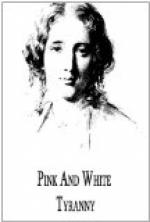“I didn’t know he was such a puppy!” said John to himself, as he stood in a sort of angry bashfulness, envying the man that was so familiar with that loveliness.
[Illustration: “I didn’t know he was such a puppy.”]
Ah! John, John! You wouldn’t, for the world, have told to man or woman what a fool you were at that moment.
“What a fool I am!” was his mental commentary: “just as if it was any thing to me.” And he turned, and walked to the other end of the veranda.
“I think you’ve hooked another fish, Lillie,” said Belle Trevors in the ear of the little divinity.
“Who...?”
“Why! that Seymour there, at the end of the veranda. He is looking at you, do you know? He is rich, very rich, and of an old family. Didn’t you see how he started and looked after you when you came up on the veranda?”
“Oh! I saw plain enough,” said the divinity, with one of her unconscious, baby-like smiles.
“What are you ladies talking?” said Carryl Ethridge.
“Oh, secrets!” said Belle Trevors. “You are very presuming, sir, to inquire.”
“Mr. Ethridge,” said Lillie Ellis, “don’t you think it would be nice to promenade?”
This was said with such a pretty coolness, such a quiet composure, as showed Miss Lillie to be quite mistress of the situation; there was, of course, no sort of design in it.
Ethridge offered his arm at once; and the two sauntered to the end of the veranda, where John Seymour was standing.
The blood rushed in hot currents over him, and he could hear the beating of his heart: he felt somehow as if the hour of his fate was coming. He had a wild desire to retreat, and put it off. He looked over the end of the veranda, with some vague idea of leaping it; but alas! it was ten feet above ground, and a lover’s leap would have only ticketed him as out of his head. There was nothing for it but to meet his destiny like a man.
Carryl came up with the lady on his arm; and as he stood there for a moment, in the coolest, most indifferent tone in the world, said, “Oh! by the by, Miss Ellis, let me present my friend Mr. Seymour.”
[Illustration: “Let me present my friend, Mr. Seymour.”]
The die was cast.
John’s face burned like fire: he muttered something about “being happy to make Miss Ellis’s acquaintance,” looking all the time as if he would be glad to jump over the railing, or take wings and fly, to get rid of the happiness.
Miss Ellis was a belle by profession, and she understood her business perfectly. In nothing did she show herself master of her craft, more than in the adroitness with which she could soothe the bashful pangs of new votaries, and place them on an easy footing with her.
“Mr. Seymour,” she said affably, “to tell the truth, I have been desirous of the honor of your acquaintance, ever since I saw you in the breakfast-room this morning.”




